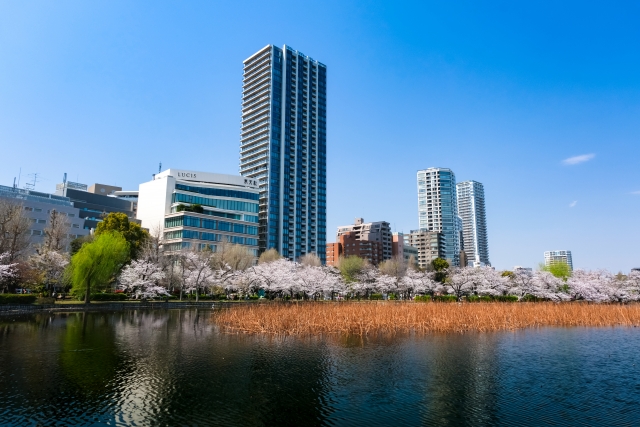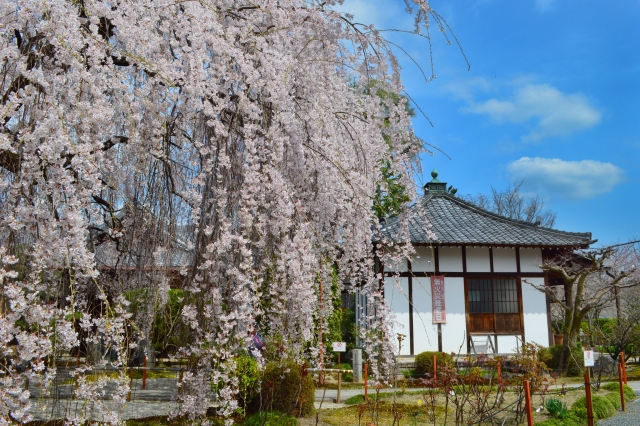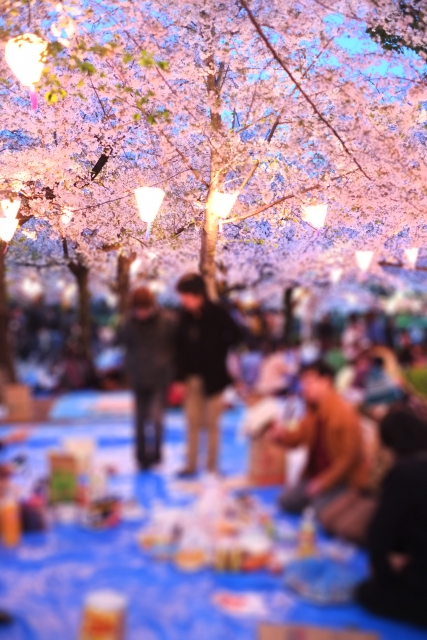Japan’s cherry blossoms (sakura:桜) transform the country into a breathtaking pink each spring, attracting visitors worldwide.
This guide will help you plan the hanami (cherry blossom viewing:花見) experience, from timing your visit to finding the most spectacular viewing spots.
When is Cherry Blossom Season
The cherry blossom season in Japan typically begins in late March and continues through early May, with trees blooming progressively from south to north.
However, exact timing varies yearly depending on weather conditions and location.
the sakura forecast
Japan’s meteorological agencies and news outlets closely monitor the cherry blossom forecast (sakura zensen:桜前線), which predicts when trees will reach full bloom across different regions.
These forecasts track two critical points.
- First Bloom (kaika:開花): When the first few blossoms open on sample trees
- Full Bloom (mankai:満開): When approximately 80% of the blossoms have opened
The period between first bloom and full bloom typically lasts about one week. Once reached, full bloom usually remains spectacular for an additional week, weather permitting.
calendar by region
| Region | First Bloom | Full Bloom |
|---|---|---|
| Okinawa | Mid-January | Early February |
| Tokyo | Late March | Early April |
| Kyoto | Late March | Early-Mid April |
| Hokkaido | Early May | Mid May |
Keep in mind that these dates are general guidelines, and actual bloom times can vary by 1-2 weeks depending on weather conditions.
Peak bloom timing tips
To maximize your chances of seeing cherry blossoms at their peak, consider these key factors.
- Temperature: Consistently warm days (above 15°C/59°F) accelerate blooming
- Previous winter: A milder winter often leads to earlier blooming
- Rainfall: Heavy rain can damage fully opened blossoms
- Location: Urban areas tend to bloom earlier due to the heat island effect
For the most flexible viewing opportunities, plan to stay in Japan for at least a week and consider visiting multiple locations at different elevations.
Best Cherry Blossom Viewing Spots
Japan offers countless stunning locations for viewing cherry blossoms, from bustling city parks to serene mountain temples.
While beautiful sakura can be found throughout the country, certain spots have earned legendary status for their spectacular displays.
Tokyo’s spots
The capital city offers an exciting blend of modern and traditional cherry blossom viewing experiences.

Here are some of Tokyo’s most renowned spots.
- Ueno Park(上野公園) – Tokyo’s most popular hanami destination, featuring over 1,000 cherry trees. Best for experiencing the lively atmosphere of Japanese cherry blossom parties.
- Shinjuku Gyoen(新宿御苑) – A sophisticated garden with late-blooming tree varieties, perfect for enjoying sakura even after the main season peaks. Features both traditional Japanese gardens and Western-style landscapes.
- Meguro River – Nearly 4 kilometers of cherry tree-lined canal, particularly stunning during evening illuminations. Known for its urban cherry blossom tunnel effect.
For a less crowded experience, consider visiting Tokyo’s hidden gems like Yanaka Cemetery(谷中霊園) or the Imperial Palace East Gardens(皇居東御苑), where you can enjoy peaceful hanami away from the major crowds.
Kyoto’s spots

Kyoto’s cherry blossoms offer a magical combination of history and natural beauty, with ancient temples and shrines serving as breathtaking backdrops.
| Location | Best Features | Best Viewing Time |
|---|---|---|
| Maruyama Park | Famous weeping cherry tree, nighttime illumination | Day and night |
| Philosopher’s Path | 2km stone path lined with cherry trees | Early morning |
| Nijo Castle | Historic setting, variety of cherry species | Late afternoon |
| Arashiyama District | Mountain backdrop, riverside views | Early morning or sunset |
These historic locations often have extended opening hours during the cherry blossom season, with many offering special evening illumination events.
Must-visit locations across Japan
Beyond Tokyo and Kyoto, Japan offers numerous spectacular cherry blossom viewing spots worth traveling for:
- Mount Yoshino (Nara) – Japan’s most famous cherry blossom mountain, with over 30,000 trees blooming at different elevations
- Hirosaki Castle (Aomori) – Combines cherry blossoms with Japan’s original castle tower and moat reflections
- Miharu Takizakura (Fukushima) – Home to a 1,000-year-old weeping cherry tree, considered one of Japan’s Three Great Cherry Trees
- Himeji Castle (Hyogo) – The magnificent white castle provides a stunning contrast to pink cherry blossoms
Each of these locations has unique characteristics that make them particularly special during cherry blossom season.
How Hanami Experience

Hanami is more than just viewing cherry blossoms. A proper hanami experience typically includes:
- Blue tarps – The essential ground covering for your picnic spot
- Seasonal foods – Such as hanami dango (sweet dumplings) and sakura-themed treats
- Beverages – Including sake and tea served in seasonal cups
Remember that popular hanami spots can get extremely crowded, especially during weekends and holidays.
Many Japanese companies and groups send someone early in the morning to reserve their spot.
For visitors, weekday mornings offer the best opportunity for a more relaxed experience.
Planning Your Cherry Blossom Trip
Planning a cherry blossom trip requires careful timing and preparation, especially since this is Japan’s peak tourist season. Early planning is essential to secure the best accommodation and travel arrangements.
Best time
The ideal timing for your cherry blossom trip depends on your preferred destinations and the year’s weather patterns.
Consider these key planning factors:
| Timing | Advantages | Disadvantages |
|---|---|---|
| Early Season (Late March) | Less crowded, lower prices | Cooler weather, risk of missing peak bloom |
| Peak Season (Early April) | Best viewing chances, festive atmosphere | Crowded, expensive, limited availability |
| Late Season (Mid-Late April) | Cherry blossoms in northern regions, less crowded | Major cities past peak, variable weather |
For the most flexible experience, consider planning a trip that spans 10-14 days and includes multiple regions at different elevations. This approach maximizes your chances of seeing peak bloom somewhere during your stay.
Transportation and accommodation
Cherry blossom season coincides with one of Japan’s busiest tourist periods.
Here’s how to navigate the challenges:
- Book accommodations 6-12 months in advance – Especially for popular areas like Kyoto and Tokyo
- Consider Japan Rail Pass – Cost-effective for visiting multiple cities
- Look into alternative accommodations – Consider ryokans in nearby cities or modern capsule hotels
Viewing tips and etiquette
To make the most of your cherry blossom experience while respecting local customs, keep these essential points in mind:
- Timing Your Visits
- Visit popular spots early morning or evening to avoid peak crowds
- Check illumination schedules for evening viewing opportunities
- Consider weekday visits instead of weekends
- Photography Tips
- Bring a wide-angle lens for tunnel-like cherry blossom paths
- Consider a tripod for night photography (check if allowed)
- Morning light often provides the best photo opportunities
- Cultural Etiquette
- Never shake or climb trees to get better photos
- Keep noise levels reasonable, especially in temple grounds
- Clean up thoroughly after hanami parties
Remember to pack accordingly for variable spring weather: layers, rain gear, and comfortable walking shoes are essential. A small picnic mat can also come in handy for impromptu hanami opportunities.


comment